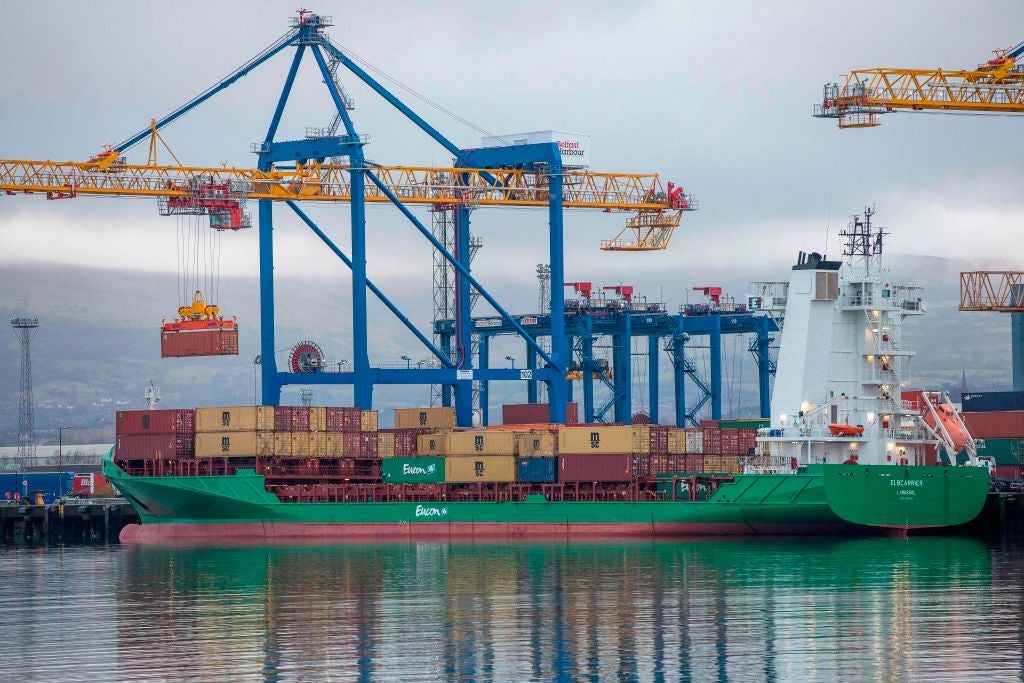Brexit: Northern Ireland development agency boasts of dual access to GB and EU markets
New arrangements provide NI manufacturers with ‘unique opportunity’ for trade, body says

Your support helps us to tell the story
From reproductive rights to climate change to Big Tech, The Independent is on the ground when the story is developing. Whether it's investigating the financials of Elon Musk's pro-Trump PAC or producing our latest documentary, 'The A Word', which shines a light on the American women fighting for reproductive rights, we know how important it is to parse out the facts from the messaging.
At such a critical moment in US history, we need reporters on the ground. Your donation allows us to keep sending journalists to speak to both sides of the story.
The Independent is trusted by Americans across the entire political spectrum. And unlike many other quality news outlets, we choose not to lock Americans out of our reporting and analysis with paywalls. We believe quality journalism should be available to everyone, paid for by those who can afford it.
Your support makes all the difference.An economic development agency in Northern Ireland is ramping up its promotion of the region's "unique" post-Brexit trading position.
In a new webpage published this week, Invest NI boasts of "unfettered" market access to both Great Britain and the European Union.
The Northern Ireland protocol, as set out in Brexit deal, means the region "can become a gateway for the sale of goods to two of the world's largest markets", the body says.
Founded in 2002, Invest NI's role is to grow the economy, help businesses compete internationally and attracting foreign investment.
It is part of the department for the economy, run by DUP minister and Belfast West MLA Diane Dodds.
The protocol provides "a unique proposition for manufacturers based in NI as well as those seeking a pivotal location from which to service GB and EU markets," Invest NI's webpage adds.
Although the Brexit deal gives NI access to both markets, there has been some disruption to trade between NI and Great Britain.
Under the terms of the Withdrawal Agreement, NI is continuing to follow the EU's single market and customs rules to prevent a hard border on the island of Ireland and therefore protect the Good Friday Agreement.
The new rules, which essentially put a border down the Irish Sea, mean that products coming into NI from the rest of the UK are subject to checks, resulting in delays to some goods.
The most onerous checks are on animal products because the EU and the UK follow different rules on standards.
In December last year the DUP leader and NI first minister, Arlene Foster, sought to tout the benefits of the protocol.
She said it made Northern Ireland an attractive destination for US firms seeking access to both the EU and UK markets.
But the party's stance has shifted somewhat since then under growing pressure from its grassroots supporters, who say the protocol poses an existential threat to NI's constitutional place within the EU.
Citing trade disruption and the EU's threat to trigger Article 16, which undoes parts of the Northern Ireland protocol, the DUP earlier this month launched a campaign to have it removed.
And despite Invest NI's drive to highlight the benefits of the new trading arrangements, this week the DUP wrote to Westminster MPs urging them to support its calls for the protocol to be scrapped.
Opposition parties in NI have accused the DUP of showing little effort in trying to find workable solutions to the trade disruption.
The EU Commission and the Republic of Ireland government, which played a key role in the Brexit talks, have both said the NI protocol will not be removed.
Prime minister Boris Johnson previously said he would be willing to trigger Article 16 if trade problems persist, although neither he nor the DUP has outlined what might replace it.



Join our commenting forum
Join thought-provoking conversations, follow other Independent readers and see their replies
Comments